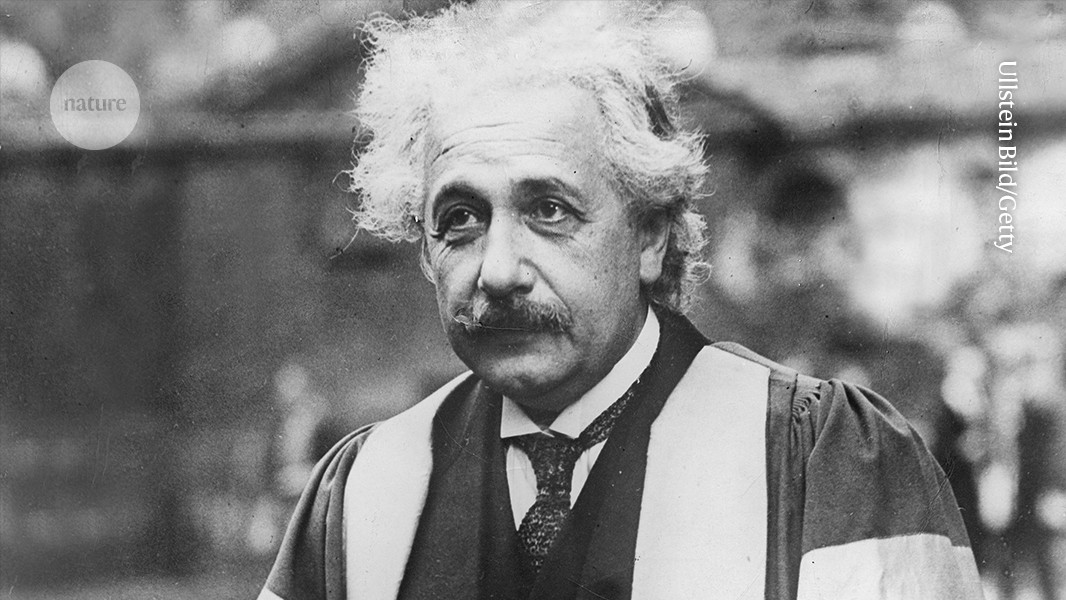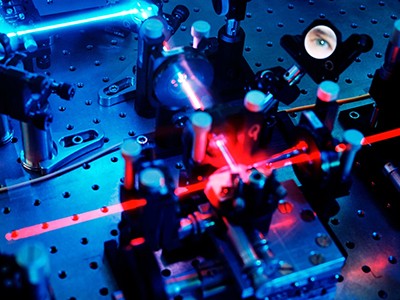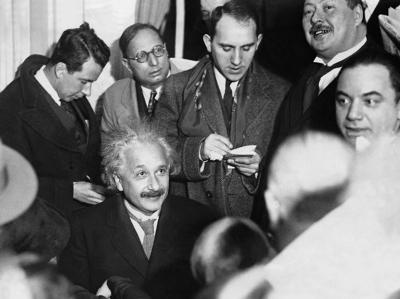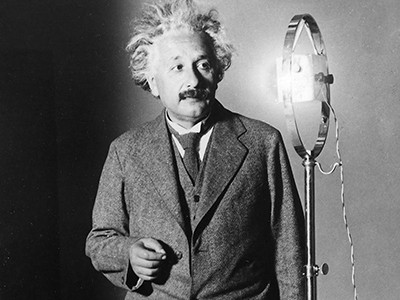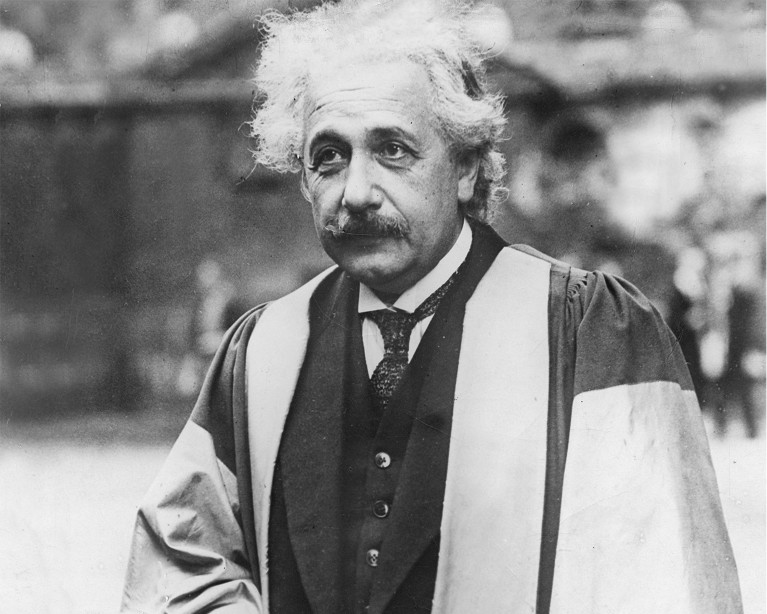
Einstein received an honorary doctorate from the University of Oxford, UK, in 1931.Credit: Ullstein Bild/Getty
Extreme politics and wars today are causing scientists to offer displaced colleagues office and laboratory space. In the 1930s, in the turbulent years leading up to the Second World War, similar offers arguably transformed both science and politics, with hundreds of researchers emigrating from mainland Europe to the United Kingdom and the United States in the face of the growing Nazi threat.
Albert Einstein was perhaps the most famous of these scientific refugees. In 1933, before emigrating permanently to the United States, he spent about two months in the United Kingdom — first in Oxford, then in Glasgow, London and Norfolk. Although the UK visits were short, they were notable and left many legacies.
How did the Big Bang get its name? Here’s the real story
Einstein’s involvement with Oxford was initially at the invitation of Frederick Lindemann, a German-born experimental physicist based at the University of Oxford, to give prestigious lectures. As war clouds gathered, Lindemann encouraged top European physicists who were anxious about Nazi persecution to come and work in his department.
Lindemann would later act as science adviser and close confidant of UK prime minister Winston Churchill (Nature 180, 579–581; 1957). During the Second World War, while Einstein warned US president Franklin Roosevelt about Germany’s plans to build a nuclear weapon, Lindemann advised Churchill (Nature 459, 36–39; 2009) about the threats posed by German U-boats, V1 flying bombs and rockets, the bombing of Germany and the creation of the atom bomb.
The enduring relationship between Einstein and Lindemann is an intriguing one, even if not well documented. Built slowly and sporadically over decades, it was never close but always mutually admiring and played a key part at key times in both their lives.
College visits
The two physicists first encountered each other in 1911, at the Solvay Conference in Brussels. This landmark meeting, focused on the emerging theory of radiation and quanta, brought together the best scientists of the time to try to unify classical and quantum physics.
Lindemann, who had been awarded his PhD in 1910 at what is now the Humboldt University of Berlin, was the youngest attendee. In 1911, he and his supervisor Walther Nernst built an experiment that confirmed a 1907 prediction by Einstein, based on quantum theory, about the behaviour of solids at extremely low temperatures — to the evident pleasure of Einstein.
When the First World War broke out in 1914, Lindemann returned abruptly to the United Kingdom, where he had spent his formative years and where his wealthy family was based. From 1915, he worked as a physicist-cum-engineer for the Royal Air Force, before settling as a professor of physics at Oxford in 1919. Based in the Clarendon Laboratory, he devoted himself to reviving the then-moribund study of ‘experimental philosophy’ at the university.
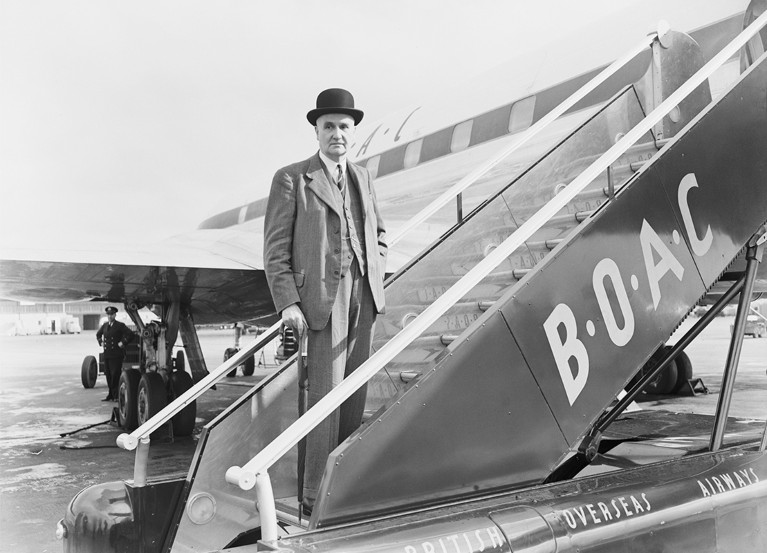
Frederick Lindemann boarding a flight from London to Australia in 1953.Credit: Jimmy Sime/Central Press/Hulton Archive/Getty
Einstein was one of those he called on — a famous figure, particularly following his development of the general theory of relativity, published in 1915. He had remained in Berlin during the war and had turned against the horrors of conflict, becoming a forthright pacifist — unlike Lindemann.
In 1921, they met again when Einstein came to give celebrated lectures in Manchester and London. For a few hours, Lindemann whisked Albert and his wife Elsa from London to Oxford in his car. But although the couple enjoyed their brief tour of the university, Einstein would not return there for another decade.
This was not for lack of enthusiasm. Einstein regarded British physics — in particular the work of Isaac Newton on gravity and James Clerk Maxwell on electromagnetism — as his chief inspiration. When Lindemann invited him to lecture in Oxford in 1927, Einstein replied flatteringly from Berlin (in German): “How gladly would I accept, particularly as I value highly the milieu of English intellectuals”.
‘Shut up and calculate’: how Einstein lost the battle to explain quantum reality
But other factors, including Einstein’s health, intervened. And only after Lindemann had himself visited Berlin in 1930 did Einstein finally agree to deliver three lectures in May 1931, while living in Lindemann’s Oxford college, Christ Church. Given in German, the first was entitled simply ‘The Theory of Relativity’. The second dealt with relativity and its implication that the Universe could be expanding: then a subject of great debate, following the 1929 discovery by astronomer Edwin Hubble that galaxies are receding. The third, given immediately after the university had awarded Einstein an honorary doctorate, tackled Einstein’s constantly evolving unified theory of physical fields.
The lectures themselves were of no lasting scientific significance, repeating ideas in published works or that were soon superseded. But some of their scribbled blackboard notes did live on — one still takes pride of place in Oxford’s History of Science Museum, which describes it ironically as a ‘relic of a secular saint’ (see go.nature.com/3xp87zt). Einstein disliked and protested at this adulatory treatment, calling the blackboards’ preservation a “personality cult, with adverse effect on others”. Arriving back at Christ Church, he wrote of how he “felt shattered. Not even a cart-horse could endure so much!”
He was more charmed by other aspects of Oxford. He played his violin together with professional musicians, who were organized by his friend Margaret Deneke; gave talks on politics, including his belief in pacifism; and spent much time wandering around the city, often on his own. Hence Einstein’s return to Oxford for a few weeks in 1932, when he again lived in Christ Church; Lindemann had arranged for the college to offer Einstein a five-year ‘studentship’, inviting him to reside for about a month each year during term time.
Darker times
But the political atmosphere in Europe was quickly darkening, as is evident in letters exchanged by the pair in early May 1933, after the Nazis seized power in Berlin. In late March, after Einstein’s return from lecturing in the United States, he and Elsa had avoided Berlin and settled in a rented holiday house on the Belgian coast. Now Einstein wrote briefly to Lindemann asking for college accommodation in June: a small room would do, given the short notice.
“You have probably heard of my little duel with the Prussian Academy,” he wrote. Einstein had resigned from the academy on 28 March, after it had accused him of “atrocity propaganda” against Germany in his public attack on the new government on 10 March. “I shall never see the land of my birth again.”
How Einstein built on the past to make his breakthroughs
Lindemann replied immediately, offering a set of rooms, although “as we did not know your plans I am afraid they will be somewhat smaller than last year”. He also described his own urgent visit to Berlin in mid-April to meet other threatened physicists. “Everybody sent you their kind regards,” he reassured Einstein, “but it was felt that it would be damaging to all concerned to write to you” — given the Nazi regime’s scrutiny of mail.
Then Lindemann turned to what could be done to help physicists, by finding them positions in the United Kingdom. “I need scarcely say that very little money is available and that it would cause a lot of [ill] feeling”, he admitted, “even if it were possible to place them in positions normally occupied by Englishmen.”
He asked for Einstein’s view of two individuals: Hans Bethe and Fritz London. The former would go on to win a Nobel prize in 1967 for his work on the formation of elements in stars, the latter to make fundamental contributions to theories of chemical bonding. Characteristically, Lindemann was looking for “the sort of man who can work out a problem and get an answer … rather than the more abstract type who would spend his time disputing with the philosophers”.
Einstein replied, ominously, that “the Nazis have got the whip hand in Berlin”. He highly recommended Fritz London (who soon departed for Oxford) but said he knew little about Bethe. Regardless, he said, he was grateful to Lindemann for his efforts. He offered to give one-third of his salary that year to help his threatened German–Jewish colleagues.
Great gratitude
In late May, Einstein again returned to Oxford — now as a refugee, after increasing harassment by the Nazi regime. At a public event on 2 June, he appeared sorely in need of reassurance, as he offered a vote of thanks for a lecture by visiting nuclear physicist Ernest Rutherford. According to an undergraduate in the audience, Einstein seemed “a poor forlorn little figure”. Yet “his whole face seemed transfigured with joy” when he received thunderous applause at the end of his speech.
One week later, Einstein himself delivered a lecture, now regarded as one of his most influential, entitled ‘On the Method of Theoretical Physics’. He began by expressing his “great gratitude” to the university, and his feeling that “the links between this university and myself are becoming progressively stronger”. But this was not to be realized. Soon, Einstein left Oxford for Glasgow, then Belgium. He revisited the United Kingdom briefly in July, to meet Churchill together with Lindemann, and returned from Belgium to spend part of September and October at a secret address in Norfolk, to escape likely assassination by Nazi agents — but he did not go back to Oxford. He would never see the city again after he moved to Princeton in New Jersey, to the great disappointment of Lindemann, who had hoped Einstein would settle in Oxford.

Equations written down by Einstein are on display at the Oxford History of Science Museum.Credit: Werner Forman/Universal Images Group/Getty
Nonetheless, the pair remained in touch through correspondence, and held each other in high esteem. When Einstein died in 1955, Lindemann’s draft obituary championed Einstein’s “brilliant originality, his fecund adventurous imagination, his uncompromising logic, and his clear exposition”.
Einstein’s view of Lindemann was reported by economist Roy Harrod, a Christ Church colleague in the 1930s. In his memoir of Lindemann, Harrod recalled how some younger physicists had cornered Einstein one evening and asked what he thought of ‘the Prof’ (as Lindemann was known). Einstein told them that, although Lindemann was “essentially an amateur”, his thorough comprehension of physics meant that “if something new came up, he could rapidly assess its significance for physics as a whole, and there were very few people in the world who could do that.”
Physicists and historians since have struggled to understand why Einstein thought so highly of Lindemann, who as a physicist was never placed in the top rank. Historian Robert Blake, another Christ Church colleague, remembered him as “a man of intuition and flair in widely diverse fields”, but who never achieved mastery in any one. As Lindemann himself honestly remarked1: “I can understand and criticize anything, but I have not got the creative power to do it myself.” But he undoubtedly showed his brilliance in debates, and knew how to work in a team, as he had proved in the Royal Air Force by his empirical testing of ways in which aircraft spin.
Certainly, the two men didn’t share the same politics. Lindemann’s views were well to the right of Einstein’s (although never sympathetic to Nazism). As Blake summarized it, Lindemann was “an out-and-out inequalitarian who believed in hierarchy, order, a ruling class, inherited wealth, hereditary titles and white supremacy (the passing of which he regarded as the most significant change in the twentieth century)”. Yet, in private, he could be kind-hearted and generous to those in need, drawing on his wide contacts and personal wealth.
Both attitudes — public and private — coloured Lindemann’s Daily Telegraph obituary of Einstein2. Although overflowing with respect for Einstein’s science, Lindemann criticized his liberal and pacifist politics: “Like many scientists Einstein was politically rather naïve. He hated violence and war and could not understand why his own natural sweet reasonableness was not universal.”
Did Einstein really say that?
Undoubtedly, Lindemann’s contrary personality polarized his contemporaries, as it does historians today. His most recent biographer, Adrian Fort, notes: “It has often been asked how a prickly, eccentric, arrogant, sarcastic and uncooperative man — to use some of the adjectives from time to time levelled against Lindemann — could have developed and sustained such a warm friendship with Churchill. The answer is of course that he did not display those characteristics to Churchill.” Presumably, a similar self-restraint pervaded Lindemann’s relationship with Einstein. Their overriding passion for physics united them, despite their profound personality differences.
As Lindemann also recalled of Einstein in his obituary, “his simplicity and kindliness, his unpretentious interest in others and his sense of humour charmed all who knew him” — qualities that the Prof surely knew were not his own forte. They are wonderfully evident in an anecdote about the emigré Einstein in Oxford, recalled in a 1968 article for Reader’s Digest (subsequently republished in an extended form3) by William Golding — the celebrated novelist and later a Nobel laureate in literature.
In 1931, Golding wrote, he was an undergraduate standing on a bridge overlooking the city’s river when a “tiny moustached and hatted figure” joined him. Not speaking each other’s language, for five minutes the strangers stood silently side by side. At last, Golding recalled, “with true greatness, Professor Einstein realized that any contact was better than none”. He pointed to a trout wavering in midstream. “Fisch”, he said. “Desperately I sought for some sign by which I might convey that I, too, revered pure reason. I nodded vehemently. In a brilliant flash I used up half my German vocabulary: Fisch. Ja. Ja.” For another five minutes, the unknown undergraduate and the world-famous scientist stood together. “Then Professor Einstein, his whole figure still conveying goodwill and amiability, drifted away out of sight.”


